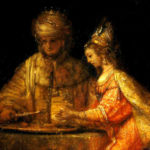We run our website the way we wished the whole internet worked: we provide high quality original content with no ads. We are funded solely by your direct support. Please consider supporting this project.
In your Anabaptist view, should Christians get involved in politics at all? Do you think they should even vote?
Ultimately, each person must follow their conscience when it comes to whether or not they vote, how they vote if they decide to vote, and the extent to which they should involve themselves in the political system. But we must always remain aware of the dangers involved in participating in the political system, for it is under the strong influence of Satan (Lk 4:5-7; 1 Jn 5:19). The political system will always try to lure us into believing that our particular way of doing politics is the “Christian” way and tempt us into placing our trust in (what we think is) the wisdom and righteousness of our political positions rather than in the power of self-sacrificial love.
When Christians begin to think this way, it inevitably divides the church, since the ambiguity of politics is such that on most issues, good and decent people can and do disagree. If I naively pronounce that my views are the “Christian” views, then your views must be judged to be “un-Christian” if they disagree with me. This is arrogant and naive. It’s also unbiblical. Jesus called both Matthew, a tax collector, and Simon, a Zealot, to be his disciples. Tax collectors and zealots were at opposite sides of the political spectrum in the first century. Yet we don’t read a word in the Gospels about whose views Jesus thought were most correct, for the Kingdom he came to establish is “not of this world” (Jn 18:36).
Even more importantly, when followers of Jesus get co-opted by the political system it distracts us from the Kingdom work we’re called to do. To the extent that we place our trust in exercising power over others, we stop trusting our mandate to exercise power under others through sacrificial service. Paul warns us not to get too involved in the affairs of the world, including its politics, but to always focus on pleasing our commander (2 Tim. 2:4). Our commander tells not to trust the “power over” mentality that politics exercises, but to instead follow his example of exercising power under people by loving and sacrificing for them.
We who follow Jesus must always remember we belong to a radically different country with a radically different King who offers radically different solutions to the problems of life. We are missionaries in whatever earthly kingdom we happen to find ourselves in. We are citizens of heaven before we’re citizens of any earthly kingdom (Phil. 3:20). It’s therefore unwise and unbiblical for us foreigners to think it our job to try to run the government of this alien land.
Whether our mission field happens to be democratic, socialistic, communistic, totalitarian or libertarian makes no difference. We’re to keep our focus on carrying out the will of our Lord. We’re to obey laws insofar as they’re consistent with our Kingdom call and to disobey them insofar as they’re not (Ac 5:29) — all the while being willing to graciously suffer the consequences of doing so (I Pet 2:13-25). We’re to pray for our leaders and sacrificially serve our neighbors. But we must never buy into the world’s “power-over” way of solving social problems.
So follow your conscience on political participation, but be careful, and never put your trust in it.
Category: Q&A
Tags: Politics, Q&A, Social Issues
Topics: Ethical, Cultural and Political Issues
Related Reading

The Testimony of Life and Death
David Kuo was a friend of ours. He was a passionate voice calling the church away from political division and calling us towards compassionate engagement. He succumbed to brain cancer this last week after a ten year struggle with the disease. Andrew Sullivan attended David’s funeral and reflected on David’s influence in his life. He…

How does an Open Theist explain all the prophecies fulfilled in the life of Jesus?
Question: Throughout the Gospels it says that Jesus “fulfilled that which was written.” Some of these prophecies are very specific and involve free decisions of people. For example, a guard freely chose to give Jesus vinegar instead of water (Jn 19:28), yet John says this was prophesied in the Old Testament, hundred of years before…

What is the significance of Exodus 16:4?
The Lord commands the Israelites to gather only enough bread for one day while in the wilderness. “In that way,” the Lord says, “I will test them, whether they will follow my instruction or not.” Testing people to find out how they will resolve their character only makes sense if God is not certain of…

What is the significance of Esther 4:14?
The wise Mordecai encourages Esther to bravely risk her life by pleading the case of the Jews before King Xerxes, saying, “…if you remain silent at this time, relief and deliverance for the Jews will arise from another place, but you and your father’s family will perish. And who knows but that you have come…

In light of Einstein’s conclusion that time is relative, how can you believe that God is not above time?
Relatively Theory basically stipulates that whether an event is viewed as being in the past, present or future depends on where one is in relation to the event in question as well as how fast one is moving. Some people conclude from this that Relativity Theory lends support to the classical view of God in…

What is the significance of Deuteronomy 13:1–3?
Moses tells the Israelites that God allowed false prophets to sometimes be correct because “the Lord your God is testing you, to know whether you indeed love the Lord your God with all your heart and soul.” If God already knows such matters with certainty, Scripture’s inspired description as to why such testings take place…
